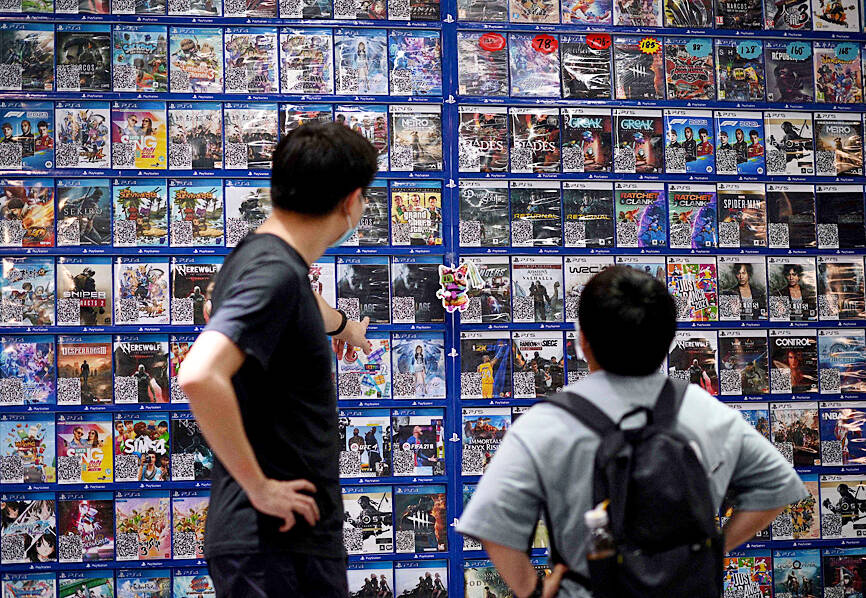China’s NetEase Inc (網易) and US games peer Microsoft Corp yesterday said they would bring popular titles including World of Warcraft back to China after a fallout involving the developer that ended an almost 15-year partnership.
The pair are working to bring online games from Blizzard Entertainment Inc — a subsidiary of Activision Blizzard Inc, which Microsoft bought last year — back to the world’s second-largest economy, starting this summer, they said in a joint statement.
NetEase was the publisher of Blizzard games in China from 2008 to last year.

Photo: AFP
“We at Blizzard are thrilled to re-establish our partnership with NetEase and to work together, with deep appreciation for the collaboration between our teams, to deliver legendary gaming experiences to players in China,” Blizzard Entertainment president Johanna Faries said in the statement.
NetEase and Microsoft have agreed to explore bringing NetEase titles to Microsoft’s Xbox and other gaming platforms, the companies said.
Several Blizzard’s games were taken offline in China in January last year after the developer terminated the partnership with NetEase citing disagreement over intellectual property control. The pair subsequently sued each other.
Tension eased after Microsoft acquired Activision Blizzard in October last year, which was followed by management changes. Chinese media then reported that Microsoft and NetEase were seeking ways to relaunch Blizzard games in China.
The renewed publishing agreement covers Blizzard’s flagship games World of Warcraft and Hearthstone as well as other titles in the Warcraft, Overwatch, Diablo and StarCraft franchises, the joint statement showed.
The news would be a welcome boost for NetEase, which like many of the country’s tech giants has had a rough few years after a government crackdown on the industry.
“We have always expected NetEase will regain distribution rights of Blizzard’s games, and the re-engagement translates to about 2 percent incremental earnings for NetEase,” Morningstar Inc analyst Ivan Su (蘇汝哲) said.
Blizzard’s games were popular in China, with local media estimating Chinese players of World of Warcraft alone at about 5 million in 2009 after NetEase became the publisher.
World of Warcraft is an online multiplayer role-playing game set in a fantasy medieval world. It is known for its immersive and addictive gameplay, in which players rack up hundreds of hours of game time.
The breakup sparked an outcry with Chinese players bemoaning lost access to their favorite games. More than 1 million users requested refunds for unspent in-game credit, NetEase customer service said shortly after the games were taken offline.

CAUTIOUS RECOVERY: While the manufacturing sector returned to growth amid the US-China trade truce, firms remain wary as uncertainty clouds the outlook, the CIER said The local manufacturing sector returned to expansion last month, as the official purchasing managers’ index (PMI) rose 2.1 points to 51.0, driven by a temporary easing in US-China trade tensions, the Chung-Hua Institution for Economic Research (CIER, 中華經濟研究院) said yesterday. The PMI gauges the health of the manufacturing industry, with readings above 50 indicating expansion and those below 50 signaling contraction. “Firms are not as pessimistic as they were in April, but they remain far from optimistic,” CIER president Lien Hsien-ming (連賢明) said at a news conference. The full impact of US tariff decisions is unlikely to become clear until later this month

With an approval rating of just two percent, Peruvian President Dina Boluarte might be the world’s most unpopular leader, according to pollsters. Protests greeted her rise to power 29 months ago, and have marked her entire term — joined by assorted scandals, investigations, controversies and a surge in gang violence. The 63-year-old is the target of a dozen probes, including for her alleged failure to declare gifts of luxury jewels and watches, a scandal inevitably dubbed “Rolexgate.” She is also under the microscope for a two-week undeclared absence for nose surgery — which she insists was medical, not cosmetic — and is

GROWING CONCERN: Some senior Trump administration officials opposed the UAE expansion over fears that another TSMC project could jeopardize its US investment Taiwan Semiconductor Manufacturing Co (TSMC, 台積電) is evaluating building an advanced production facility in the United Arab Emirates (UAE) and has discussed the possibility with officials in US President Donald Trump’s administration, people familiar with the matter said, in a potentially major bet on the Middle East that would only come to fruition with Washington’s approval. The company has had multiple meetings in the past few months with US Special Envoy to the Middle East Steve Witkoff and officials from MGX, an influential investment vehicle overseen by the UAE president’s brother, the people said. The conversations are a continuation of talks that

Alchip Technologies Ltd (世芯), an application-specific integrated circuit (ASIC) designer specializing in artificial-intelligence (AI) chips, yesterday said that small-volume production of 3-nanometer (nm) chips for a key customer is on track to start by the end of this year, dismissing speculation about delays in producing advanced chips. As Alchip is transitioning from 7-nanometer and 5-nanometer process technology to 3 nanometers, investors and shareholders have been closely monitoring whether the company is navigating through such transition smoothly. “We are proceeding well in [building] this generation [of chips]. It appears to me that no revision will be required. We have achieved success in designing